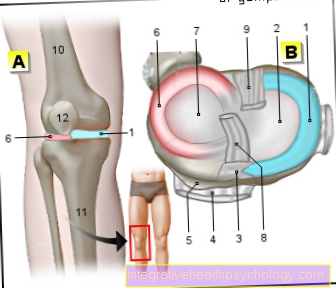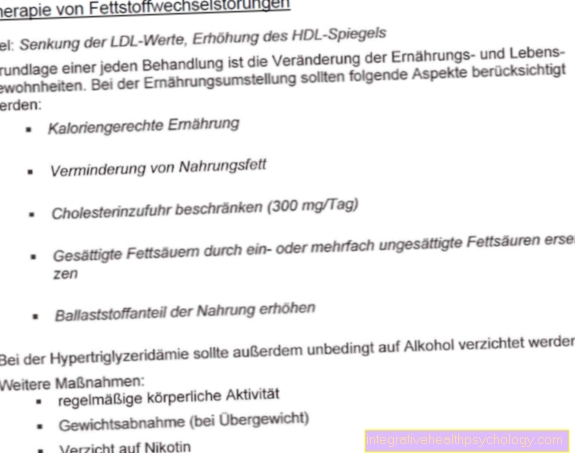Almased®
introduction
Almased® is a product that is available in powder form in pharmacies and is intended to help reduce weight. It is therefore a weight loss product, which is based on the fact that the metabolic performance of the body is boosted and thus more fat is burned while at the same time the muscles are not broken down. With the help of Almased®, the patient should be able to lose up to 5kg within a week. Nevertheless, from a medical point of view, Almased® is a slimming product that is only marginally promising.
You might also be interested in this topic: Turbo diet

ingredients
According to the manufacturer, Almased® only contains natural substances. The most important ingredient is soy, which is rich in isoflavones. Soy consists mainly of protein, which ensures that the patient consumes enough protein with Alamased®, but hardly any carbohydrates.
Another ingredient in Almased® is a so-called probiotic yoghurt. This also consists almost exclusively of proteins and thus also ensures that the patient consumes enough protein but no carbohydrates. According to the manufacturer, the effect of the soy should also be increased by the yogurt.
So that Almased® gets some flavor, the product also contains honey, which has a natural sweetness and thus makes the powder taste pleasant. According to the manufacturer, this product does not contain much more. Thus, it is a very protein-rich powder that has been lightly sweetened with the help of honey. Almased® hardly contains any carbohydrates, which is what the effect of this drug is based on.
Overall, thanks to its protein-rich composition, Almased® should activate the metabolism and thus stimulate fat burning. At the same time, the proteins should ensure that muscles are not broken down by malnutrition. Since no carbohydrates are supplied to the body, the protein should cause the body's non-fat reserves to be attacked and broken down by the body.
Another important aspect of the Almased® diet is that the powder provides the body with all of the so-called essential amino acids. These are certain substances that the body cannot produce itself and must therefore be consumed with food, as otherwise a deficiency can occur.
How the drug works
Almased® is a protein-rich powder that can be taken in the form of shakes. These shakes are then intended to replace a meal, so that the patient only consumes 230 kilocalories. A meal that has been replaced by an Almased® shake consists of 230 calories, which in turn consist almost exclusively of protein.
This one Almased® shake should ensure that the patient no longer feels hungry for about 4 hours. The protein-rich diet should lead to the metabolism being heated up and the body starting to burn fats. Since the body does not receive any carbohydrates, it attacks the fat reserves. As a result, Almased® should lead to the fact that up to 5 kg of weight can be lost within a week without losing any muscles.
Overall, Almased® is viewed as a low calorie diet. This means that the Almased® shakes add fewer calories to the patient's body than it actually needs. For example, a woman in her 30s needs around 1500 calories a day. With the help of Almased®, however, the patient only consumes around 700 calories per day. This leads to the fact that the body begins to starve and, in order to maintain the metabolism, begins to break down the reserve fats.
If a patient is exclusively starving, the patient's body also reduces metabolic performance, which makes the patient more tired, less concentrated and weaker. Almased® is supposed to prevent this by adding enough proteins to the body so that the metabolic performance remains constant.
According to the manufacturer, Almased® should even boost the metabolism to such an extent that the patient still feels fitter and feels more energy despite malnutrition. In addition, Almased® is said to have a positive effect on the health of the patient, as the low-fat diet is intended to reduce blood lipids (cholesterol). The blood sugar should also be lowered and the patient should also have a stronger immune system.
The main effect of Almased® is based on the fact that after consuming Almased® the blood sugar hardly rises, since Almased® hardly contains any carbohydrates and therefore hardly any sugar. As a result, the body hardly reacts to food and releases very little of the hormone insulin from the pancreas.
In general, insulin ensures that more fat is absorbed by the body and more sugar moves from the intestines into the blood. One speaks of an anabolic hormone because insulin ensures that fat reserves are built up and increased in storage. After every meal, the body releases insulin so that the nutrients from the intestines are absorbed into the blood and then stored in the body. Since hardly any insulin is released after a meal that has been replaced by an Almased® shake, more fat is burned and broken down in the body and fewer nutrients are absorbed from the intestines.
Course of the Almased® diet
The Almased® diet, also known as the Markert diet, follows a strict principle which should be adhered to so that the patient loses weight sufficiently and thus achieves the desired success. The patient must not consume solid food for the first 3 to 10 days. Instead, only Almased®, vegetable juices or homemade vegetable broth and water are consumed. This principle is very similar to that of a purification cure and leads to the body and the gastrointestinal tract (gastrointestinal tract) being cleaned of toxins and harmful substances.
Read more on the topic: Markert Diet
Since the body is extremely hungry during this time, fat loss begins here. At the same time, however, the body also slows down its activity in order not to have to attack the fat reserves. Nevertheless, during this time there is sometimes a strong weight loss, which is due, among other things, to the fact that the body is dehydrated.
After these 3-10 days comes the next phase in which the patient can eat one meal a day, for example the patient can have breakfast. Lunch and dinner, on the other hand, have to be replaced by Almased®. This phase is known as the reduction phase, as Almased® is slowly reduced here and the patient's weight should also be reduced. This phase can be maintained until the patient has reached his or her target weight, but we recommend up to 6 weeks.
The next phase is then referred to as the stability phase. During this time the patient should try to maintain his dream weight without gaining any more. In this phase, only one meal, for example dinner, is replaced by Almased®. The other two main meals can be eaten normally. This phase should not be shorter than four and a half months, as otherwise the so-called yo-yo effect can occur, in which the patient, after losing a lot of weight in a short time, puts on just as much weight again very quickly. According to the manufacturer, further weight reduction should also be possible in this phase. After the 18-week stability phase, it is then possible to eat normally again, which means that the patient can then eat three meals a day again.
In addition, an Almased® shake can be integrated into everyday life. This should continue to promote fat burning and minimize the feeling of hunger. Thus, an Almased® diet lasts a total of 6 months until the patient has reached his desired weight and can keep it stable.
Where can I find good recipes to accompany the Almased® diet?
Almased® offers numerous recipes to accompany the diet. These can be viewed free of charge on the Almased® website and printed out. You can find recipes for breakfast, for soups, for fish and meat products, for vegetarian dishes and also for desserts. In addition, there are books on sale that contain numerous recipes to make the most of a diet. It is generally recommended to eat a diet rich in protein and low in carbohydrates. In addition to low-fat proteins (fish, meat), you should eat a lot of vegetables. The intake of fruit should be avoided, especially at the beginning of the diet (start and reduction phase), as this can slow down the weight loss process.
Side effects of Almased®
Almased® is a product that can be freely sold in pharmacies. For this reason, the patient should inform himself about possible risks and dangers before taking it. If you are allergic to any of the ingredients in Almased®, you should discuss taking it with your doctor.
Due to the greatly reduced calorie intake during the Almased® diet (subcaloric diet), the patient shows a decrease in concentration and performance. This is often accompanied by tiredness. The physical resilience decreases. At the same time, many patients appear irritable and show signs of depression.
In rare cases, the Almased® diet can lead to digestive problems, an increased feeling of cold or cardiac rhythm disorders. Excessive stress on the kidneys also increases the risk of kidney failure.
What are the risks / dangers of dieting with Almased®?
The side effects of an Almased® diet should not be underestimated. Since the Almased® diet means that the patient does not consume enough calories than the daily requirement requires, various side effects can occur.
On the one hand, the body is used to receiving more nutrients and is therefore overwhelmed by the drastic throttling of nutrients. There is a decrease in concentration and productivity, so that school, studies and work can often only be inadequately managed. Physical resilience also decreases significantly, so that many patients are barely able to do sports, which would, however, be very beneficial for losing weight. Since many patients also miss meals, there is also psychological stress.
The lack of nutrients also means that the patient is irritated more quickly or exhausted so that he becomes depressed. This not only results in a cognitive but also a mental burden on the patient, which in turn can also put a heavy strain on the family and the general environment.
Furthermore, muscle loss occurs in some patients despite a protein-rich diet. In addition, Almased® can cause the patient to experience severe digestive problems. The lack of food can lead to an increased sensation of cold and the patient increasingly begins to freeze.
The extremely protein-loaded diet means that the kidneys are put under enormous strain. As a result, the kidneys can be damaged, especially if Almased® is taken over a long period of time. In the worst case, Almased® can lead to kidney failure.
Cardiac arrhythmias are also possible with an Almased® diet and should not be underestimated, especially in patients with heart problems.
In general, the number of side effects compared to the effect of Almased® is alarmingly high, which is why the patient should carefully weigh the benefits and risks of this diet and, above all, speak to a doctor beforehand.
Medical evaluation of Almased® by
The effectiveness of Almased® compared to other diets is controversial. The results differ greatly from patient to patient.
The protein-rich and low-carbohydrate diet stimulates fat burning without breaking down the muscles. This distinguishes the Almased® diet from many 'lightning diets', which aim to break down muscles and only lead to weight loss for a short time. In addition, the Almased® products are well tolerated due to the use of only natural ingredients. The Almased® powder can also be used for teas, shakes and smoothies.
On the other hand, the low calorie diet shows a very wide range of side effects. In addition to a general decrease in concentration and performance, the decrease in physical resilience plays a decisive role.
During the diet, patients often feel unable to accompany the diet with physical activity and thereby strengthen the results. For this reason, the yo-yo effect occurs in many patients after the diet, as they revert to the original diet and a lifestyle without physical activity. For weight loss with Almased® to be effective, a permanent change in diet and the integration of physical activity into everyday life are necessary.
forecast
The prognosis of the Almased® diet depends very much on the patient. Some patients complain about the bad taste of the Almased® powder, which sometimes leads to nausea in the patient. As a result, the exact sequence of the plan is not possible and only one meal is replaced with Almased® instead of all, as it should be in the initial phase. This means that the prognosis is also rather poor and the patient therefore only loses a little weight with the help of Almased®.
Some patients report the so-called yo-yo effect. This means that the patient has lost a few pounds with the help of Almased®, but continued to eat after the diet as before and thus put the pounds back on very quickly.
Often patients report that there was a desired sense of achievement in the short term and especially during the diet and that the patient lost a few kilos, but this weight could not be maintained. The reason for this is the fact that no sporting activities are integrated into the Almased® diet and that the diet does not represent a permanent change in diet. The prognosis for an Almased® diet is therefore rather sobering. More promising, however, seem to be concepts that induce the patient to permanently change their diet and focus on a healthy lifestyle.
How much can I lose weight with this form of diet?
According to the manufacturer, you can lose up to 5 kilograms per week with the Almased® diet. However, this information can differ significantly from patient to patient. Through accompanying, regular physical activity, weight loss can be additionally supported and strengthened.
The fat reserves are broken down directly through the low-carbohydrate diet. The fat burning is 40% faster than with other diets.
How can I avoid the yo-yo effect with this diet?
The yo-yo effect describes the process that patients immediately gain weight again after completing their diet. Almased® products try to counteract this effect. The protein-rich diet prevents muscle breakdown during the diet. For this reason, the fat reserves are burned directly. Weight loss is therefore not due to the breakdown of the muscles but to the burning of fat.
To avoid the yo-yo effect (as with other diets) a change in diet and physical activity are necessary after the end of the diet. This allows the metabolism to be permanently changed and the patient does not gain weight again.
Alternative options and diets
There are some alternatives besides Almased®, some of which seem more promising and others less promising. However, the best and most natural form of weight loss is when the patient works with a doctor or a nutritionist to put together a diet and exercise plan. In general, sport should always be integrated into the life of every patient, whereby walking or cycling can be quite sufficient. In addition, the patient should eat health-consciously, with lots of fruits and vegetables and less fat and sugar, in order to achieve long-term weight loss without the yo-yo effect.
There is a wide range of alternative diets to Almased®. Different diets may be indicated depending on the patient and the desired weight loss. The choice of a diet can be discussed with a doctor. The majority of these diets are aimed at a change in diet with a change in the body's metabolism. A healthy and balanced diet and accompanying, regular physical activity are crucial for the long-term success of a diet.
The Almased® diet belongs to the group of formula diets. Meals are replaced by protein-rich substitute products, while products rich in carbohydrates are avoided. Often there is no lasting success and the therapies are very expensive. In the case of alkaline fasting, excess acid in the body is to be broken down by the intake of 'alkaline products' (fruit, vegetables, water, herbal tea). In detox diets, processed products (sugar, white flour, gluten, yeast) are avoided in order to remove possible toxins from the body. Interval fasting (e.g. 5: 2 fasting) aims at several fasting days a week, on which only low-calorie drinks such as tea or water are allowed. In insulin food combining diets, high-carbohydrate and high-protein meals are separated from each other. In addition, only low-carbohydrate foods are consumed in the evening in order to reduce the nocturnal secretion of insulin.
What are the costs of an Almased® diet?
According to the manufacturer, an Almased® therapy lasts at least six months until all phases (start, reduction, stability and life phase) have expired one after the other. In the life phase, which is continued indefinitely, some of the meals will continue to be supplemented or replaced by Almased® products. The daily requirement for Almased® depends on the patient's height and varies greatly. An Almased® pack of 500 grams is available in stores for a price between 15 and 20 euros.
The start phase lasts between 3 and 7 days. In addition to low-calorie drinks, you only take Almased® products. Depending on the body size, 50 to 100 grams of Almased® are required three times a day. This corresponds to about 1-2 Almased® packs (costs: approx. 30 to 40 euros).
- In the reduction phase, two meals a day are replaced over a period of 6 weeks. About 10-15 Almased® packs are required for this (costs: approx. 200 to 300 euros).
- During the stability phase, one meal a day is replaced by Almased® over a period of around 18 weeks. This corresponds to about 15-20 Almased® packs (costs: approx. 250 to 400 euros).
- In the life phase, meals are supplemented with 50g-Almased® once a day. A 500g pack of Almased® is therefore sufficient for 10 days.
This phase can be continued indefinitely as a supplement to a wholesome diet.
Is there Almased® lactose-free?
The normal, commercially available Almased® contains only a very small amount of lactose and generally does not cause any symptoms in patients with lactose intolerance. Studies have shown that only 1 in 15 lactose intolerant patients developed symptoms after taking Almased®. Nevertheless, the intake should be tried carefully at the beginning of the diet.
Almased® during breastfeeding - is that possible?
Rapid and high weight loss due to an Almased® diet during breastfeeding should be avoided (no more than 1 kg per week recommended). Due to the strong breakdown of fat, there is an increased release of acids and toxins into the bloodstream and there is a risk of them getting into breast milk. The majority of breastfeeding women automatically lose a few kilograms of body weight due to an increased calorie requirement after pregnancy.
Alternatively, the patient can change her diet and be physically active to lose weight. Almased® can be used in lower doses as a food supplement (not for diet) during breastfeeding.
Almased® and alcohol - are they compatible?
If possible, alcohol consumption should be avoided while dieting with Almased®. Alcohol leads to a disturbance of the fat metabolism and the water balance in the human body. As a result, less fat is broken down and water is removed from the body. At the same time, the absorption of nutrients in the gastrointestinal tract is influenced. The results of an Almased® diet can thereby be massively influenced and in some cases even canceled.
If the one-off consumption of alcohol during the diet cannot be avoided, it should be ensured that low-calorie alcohol (dry white wine, light beer, etc.) is consumed.





























